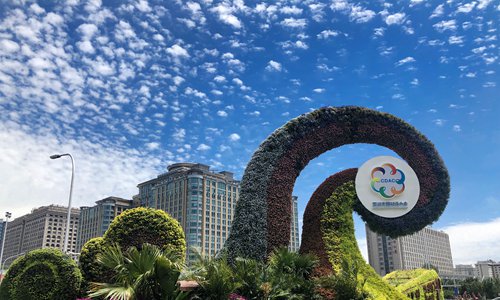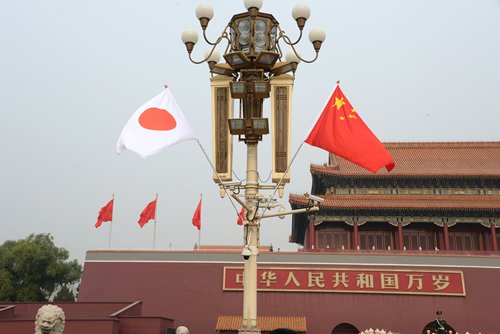HOME >> OPINION
BRI an incentive for better China-Japan ties
Source:Global Times Published: 2019/5/28 19:03:42

Photo: VCG

Photo: VCG
Editor's Note:
Relations between China and Japan have been largely back to the right track, yet still encountered some obstacles in the past few years. Global Times (GT) reporter Wang Wenwen interviewed Tsukuba University Professor Emeritus Eiichi Shindo (Shindo), head of the International Academic Society for Asian Community and the Belt and Road Initiative Japan Research Center, on China-Japan relations and the China-proposed Belt and Road Initiative (BRI) at the recent Conference on Dialogue of Asian Civilizations in Beijing in May.
GT: What is the role of Asian civilization during its ongoing development and rise?
Shindo: In the past four or five centuries, since the discovery of America by Columbus, we have undergone the centuries of the Western world. But in recent years, we have apparently had a new century based on the rise of Asia. The 20th century was filled with America, based on the second industrial revolution, but the 21st century is packed with Asia led by China's growth.
Asian countries are becoming more powerful socially and economically, and also in a diplomatic and political context. Asian cultures are having an influence in changing the world. The essence is that former centuries were led by America and Western powers based on colonialism and imperialism, but the new century is upside down.
We want neither colonialism nor imperialism. Our options are aimed at sustainability, equality, and greater connectivity. Those are the essential features of our cultures based on Buddhism, Confucianism, Taoism, Islam, and Hinduism.
Now we are gaining a new sense of diplomacy and global governance. We do not stick to democracy, alliance, coercion, sanctions and intervention, which are Western ideas. The Asian values rooted in the Bandung Conference in 1955 - non-intervention, non-alliance, neutrality and equality of all races - form the basis that leads new global governance. That is the meaning of Asia's rise.
GT: Does Japan position itself as an Asian power or Western power?
Shindo: We have fluctuated. 170 years ago since the Meiji Restoration, we got into the Western powers' fields of interests and sacrificed Asian values. The catchwords of Meiji Restoration were "Don't make friends with bad Asian comrades" and "Leave Asia and enter the Western world."
These words lose relevance among concerned intellectuals and conscious Japanese, and the keen businessmen and industrialists were realizing the reality of Asia - the vast markets of China and the Eurasian continent.
They came to realize that Meiji Restoration philosophy didn't achieve peace and prosperity for them. So, we are changing. But the major segment of Japanese politics still sticks to the US-Japan alliance and emphasizes the potential threats from China.
GT: So how would you analyze China-Japan relations under the Abe administration?
Shindo: Even under the Abe regime, some segments of the Liberal Democratic Party (LDP) of Japan understand the significance of the huge market and more communication with China. Particularly General Secretary Nikai Toshihiro has strong feelings for China. A lot of potential pro-China politicians exist among the LDP.
But the mainstream from the Ministry of Foreign Affairs, bureaucrats, and media are addicted to Washington. That is a problem for us. This needs time because we have stuck to the Japan-US alliance system for more than 70 years. Please wait for our cooperation. We have a heavy duty to develop the common interests with China and other countries in Eurasia. BRI, in that sense, provides very good incentives for Japanese politicians and businessmen. It has a historical context and is an epoch-making policy and global strategy.
GT: But Japan has not signed a memorandum of understanding with China regarding BRI cooperation. What's your take on this?
Shindo: It takes time. We signed joint agreements with China to develop third party markets. We need more interchange and mutual discourse, particularly with media. The media has a very strong role in deciding the future of China-Japan relations.
American barriers are so high among the media. During 2013-17, however, many Japanese, including the media and businessmen, have begun to understand the significance of the BRI. But US think tanks began to propagate the BRI as another type of Chinese colonialist expansionism based on a "debt trap" discourse.
We have conducted extensive research on BRI projects in countries like Sri Lanka, Pakistan, Laos, and Greece. We had exchange programs with Chinese academicians and proved that the "debt trap" is a false myth against the BRI.
We need further discussions on the ideas from think tanks in East Asian countries focused on the BRI. We have advocated that BRI should have an Asian version of the OECD (Organization for Economic Co-operation and Development).
GT: What are the similarities between Chinese and Japanese civilizations? How could such similarities boost the political ties between the two countries?
Shindo: Buddhism and Confucianism have the same roots in the sense that both religions have many gods. They are more flexible and humanistic.
Tolerance is the word to understand the diversity of common Asian cultures. Christian and Western value systems assert that they only represent justice and democracy, but Asian cultures adopt more tolerant attitudes to dialogue with each other.
We studied Confucius in high school and had lessons in understanding the meanings of Chinese characters. This has been the essence of the Japanese education since my childhood days.
Europeans also began to understand each other through the ERASMUS Program from the 16th and 17th centuries in Western Europe. We tend to think that Western European countries had peaceful cultures in the past, but even back then they fought each other frequently. One of the reasons why they stopped fighting is the creation of the cross-border education system, which became the intellectual basis for the EU.
GT: What opportunities can Japan seek in the wake of the China-US trade war?
Shindo: We need more strategic thinking. If Japanese officials and politicians have strategic sense, they will and can cooperate more with China. But it is difficult now. We will still swing between the two. The US will continue to put heavy pressure on Japan to open its market in the agricultural and weapons sectors. The US tries to sell airplanes, fighters, and warships. So we need time. We should have a more solid cooperative foundation between Japan and China. In this sense, closer cooperation among third party markets should be promoted more aggressively and in positive ways toward the Silk Road of the 21st century.
Posted in: